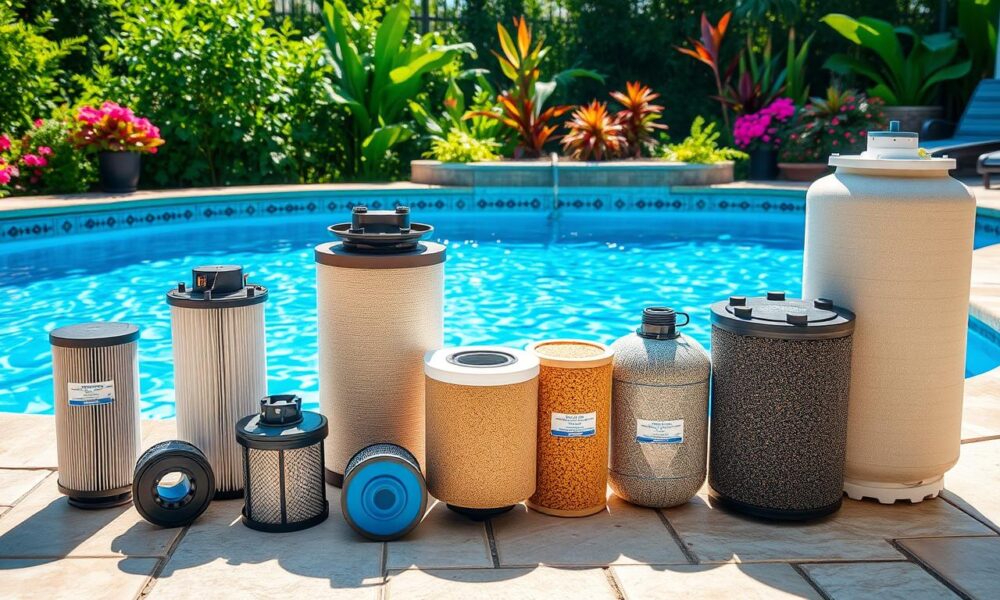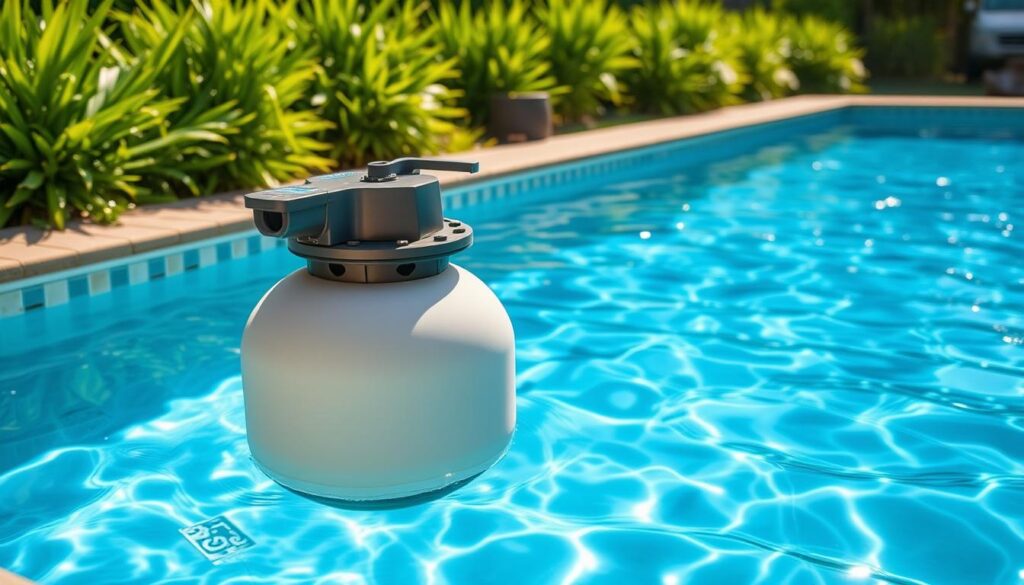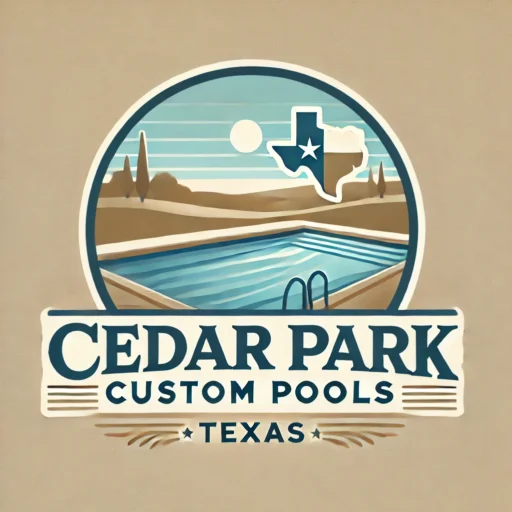
How to Choose the Best Pool Filters for Clean and Crystal-Clear Water
Keeping your pool water clean and clear is key for fun and safety. The right pool filter is crucial for this. This guide will show you the different types of filters, their good and bad points, and how to pick the best one for your pool.
Key Takeaways
- Understand the importance of pool filters in maintaining water quality and prolonging pool system lifespan.
- Explore the different types of pool filters, including cartridge, sand, and diatomaceous earth (DE) filters.
- Learn how to size your pool filter based on your pool’s dimensions and usage.
- Discover the benefits and drawbacks of DIY vs. professional pool filter installation and maintenance.
- Identify top pool filter brands and their reputation in the industry.
Importance of Pool Filters
Pool filters are key to keeping your pool water clean and clear. They remove dirt, debris, and contaminants. This makes the water safe and inviting for everyone to swim in.
Maintaining Water Clarity and Quality
Pool filters are essential for clear and quality water. They work hard to catch and remove impurities. This keeps the water clear and makes your pool look inviting every day.
Prolonging Pool System Lifespan
Pool filters do more than just keep the water clear. They also help extend your pool system’s life. By filtering out harmful particles, they protect the pump and other parts from damage. This can save you money by reducing repairs and replacements.
In short, pool filters are very important. They help keep the water clear and extend your pool’s life. Getting a good pool filter is a smart investment for a clean and enjoyable pool for years.

Types of Pool Filters
Choosing the right pool filter is key to keeping your pool clean. There are many types of pool filters out there. Each has its own benefits. Knowing the differences can help you pick the best pool filtration system for you.
The cartridge filter is a popular choice. It uses a fabric or paper element to catch debris. This means you don’t need to backwash it often. Another favorite is the sand filter. It uses sand to trap particles as water flows through.
If you want the clearest water, consider a diatomaceous earth (DE) filter. These filters use a fine powder to catch even tiny particles. Your pool will shine like new.
- Cartridge Filters: Efficient filtration without backwashing
- Sand Filters: Use a bed of sand to capture particles
- Diatomaceous Earth (DE) Filters: Provide exceptional water clarity

Choosing the right pool filter depends on your pool’s size, how often you use it, and what you prefer. By learning about the types of pool filters, you can make a smart choice. This way, you’ll enjoy a clean, well-kept pool all season.
Cartridge Pool Filters
Cartridge pool filters are a favorite among pool owners. They use a pleated fabric or paper to catch dirt and keep water clean. This makes your pool water clear and inviting.
Advantages of Cartridge Pool Filters
- Easy Maintenance – These filters are easy to care for. They don’t need filter media like sand or DE.
- Improved Water Clarity – Their design traps fine particles well. This results in very clear pool water.
- Reduced Operating Costs – They use less energy than other filters. This can help lower your pool costs.
Disadvantages of Cartridge Pool Filters
- Frequent Cleaning – You might need to clean or replace them often. This depends on how much you use your pool and the water quality.
- Limited Lifespan– The filter element will wear out and need to be replaced. This can be a regular expense.
- Reduced Filtration Capacity – They might not handle as much debris as bigger filters like sand or DE filters.
Cartridge pool filters are a good mix of easy use, clean water, and cost savings. They’re a popular choice for many. But, it’s key to consider both the cartridge filter advantages and cartridge filter disadvantages. This will help you decide if they’re right for your pool and maintenance needs.

Sand Pool Filters
Sand pool filters are a top pick for keeping pools clean and clear. They use sand or special media to catch dirt and keep water sparkling. This makes your pool a welcoming place to relax.
Sand filters are known for lasting a long time and working well with little upkeep. They’re great for those who don’t want to spend a lot of time on pool care. Plus, they’re easy to maintain, which is a big plus for busy people.
But, it’s important to know the downsides of sand filters too. They need regular backwashing, which takes more time than other filters. Also, they might not catch tiny particles as well as other systems.
Let’s look at the main sand filter benefits and sand filter drawbacks:
- Durability and long-lasting performance
- Relatively low maintenance requirements
- Effective at trapping larger particles
- Periodic backwashing required
- May not be as effective at removing smaller particles
In conclusion, sand pool filters are a good choice for many. They offer reliable filtration and are easy to care for. By considering the pros and cons, you can decide if a sand filter is right for your pool.
Diatomaceous Earth (DE) Pool Filters
Diatomaceous earth (DE) filters are a top pick for keeping pool water sparkling. They use a fine, powder-like media from ancient aquatic organisms. This media traps tiny particles, making it a top choice for filtration.
Understanding DE Filter Media
DE filter media is made of tiny, sharp particles. These particles form a filter cake on the filter’s surface. This cake catches even the smallest debris, like algae and bacteria, leaving water clear and clean.
Diatomaceous earth pool filters can catch particles as small as 3-5 microns. This is smaller than what sand or cartridge filters can handle. They’re perfect for keeping water quality high in pools, hot tubs, and spas.
But, DE filter media needs more care than other filters. The filter cake must be backwashed and the media replaced regularly. This extra work is worth it for the clear water DE filter advantages offer.
In summary, diatomaceous earth pool filters are a top choice for clear pool water. They’re favored by pool owners and professionals for their effectiveness.
Pool Filter Brands
Choosing the right pool filter is key to a clean pool. The brand and reputation of the filter maker are very important. Top brands are known for their quality, durability, and support.
Hayward, Pentair, and Jandy are leaders in the pool filter world. They have built a strong reputation with their innovative and effective filters. These brands meet the needs of all pool owners.
Hayward is a well-known name in the pool and spa world. They offer efficient and long-lasting filters. Pentair is famous for its advanced technology and easy-to-use designs. Jandy is known for its reliable and durable filters.
When picking a pool filter, it’s important to look at the top manufacturers. Make sure the brand fits your pool’s needs and your preferences. A quality filter from a trusted brand means a clean pool and easy maintenance.
Sizing Your Pool Filter
Choosing the right pool filter size is key for clean water and good circulation. You need to figure out your pool’s gallons and match it to the filter’s capacity. This capacity is usually in gallons per minute (GPM) or square feet (sq ft) of filter area.
Calculating Filter Capacity
When picking a pool filter, think about your pool’s size and the turnover rate you want. The pool filter size should move all your pool’s water at least once every 8-12 hours. This is called the turnover rate. To find the needed pool filter capacity, just follow these steps:
- First, find out how many gallons your pool holds. This is done by multiplying the pool’s length, width, and depth.
- Then, divide the total gallons by the turnover rate (8-12 hours) to get the needed GPM or sq ft of filter area.
- Finally, choose a filter that matches the pool filter sizing you need.
For example, a 20,000-gallon pool needing a 12-hour turnover rate would need a filter with at least 1,667 GPM (20,000 gallons / 12 hours).
It’s wise to choose a filter that’s a bit bigger. This ensures your pool’s water circulates and filters well.
Installation and Maintenance
Proper pool filter installation and regular maintenance are key. They help your pool filter work well. Some people do it themselves, but hiring a pro can give you peace of mind.
DIY vs. Professional Pool Filter Installation
If you choose to do the DIY pool filter installation, follow the manufacturer’s guide closely. Wrong installation can cause leaks, poor filter work, and harm your pool’s pipes. A pro, however, has the skills and tools to do it right, avoiding problems.
Keeping your pool filter maintenance up is also crucial. Skipping it can lower filter efficiency, raise energy use, and shorten your filter’s life.
- Regularly clean or replace the filter media as recommended by the manufacturer
- Inspect the filter housing and connections for any signs of wear or damage
- Monitor the pressure gauge and backwash the filter when the pressure rises
- Consider periodic professional maintenance to ensure your pool filter is functioning at its best
By focusing on pool filter installation and upkeep, you keep your pool water clean and clear. Enjoy fresh water for many seasons.
Conclusion
Choosing the right pool filter is key to keeping your pool water clean and clear. There are many types of filters, like cartridge, sand, and diatomaceous earth (DE) filters. Each has its own benefits and drawbacks. Knowing these can help you pick the best one for your pool.
It’s also important to look at different pool filter brands and find the right size for your pool. This ensures your filter works well and lasts a long time. You can install it yourself or get help from a pro. Regular cleaning and upkeep of your filter will keep your pool water sparkling.
If you need help choosing a pool filter or have questions, call Cedar Park Custom Pools at (737) 345-2248. They offer free consultations. Their experts can guide you and help keep your pool water crystal-clear all season.
FAQ
What are the main types of pool filters?
Pool filters come in three main types: cartridge, sand, and diatomaceous earth (DE). Each has its own benefits and drawbacks. Knowing the differences helps you pick the right one for your pool.
What are the benefits of using a pool filter?
Pool filters are key to keeping your water clear and clean. They remove dirt and contaminants, making your pool safe for swimming.
How do I determine the right size pool filter for my pool?
To find the right filter size, calculate your pool’s total gallons. Then, match it to the filter’s capacity, usually in gallons per minute (GPM) or square feet (sq ft).
Should I install the pool filter myself or hire a professional?
Installing a filter yourself can save money, but hiring a pro ensures it’s done right. Regular maintenance, like cleaning or replacing the media, keeps your filter working well.
What are the top pool filter brands to consider?
Look at Hayward, Pentair, and Jandy for top-quality filters. These brands are known for their durability and customer support.

